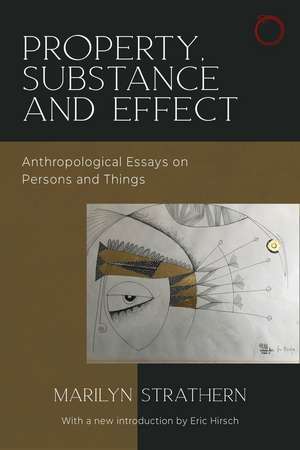Property, Substance, and Effect: Anthropological Essays on Persons and Things: Classics in Ethnographic Theory
Autor Marilyn Strathern Introducere de Eric Hirschen Limba Engleză Paperback – 15 mar 2023
Property, Substance, and Effect draws on Marilyn Strathern’s longstanding interest in the reification of social relations. If the world is shrinking in terms of resources and access to them, it is expanding in terms of new candidates for proprietorship. How new relations are brought into being is among the many questions about property, ownership, and knowledge that these essays bring together.
Twenty years have not diminished the interest in the book’s opening challenge: if one were inventing a method of enquiry by which to configure the complexity of social life, one might wish to invent something like the anthropologist’s ethnographic practice. A wide range of studies deliberately brings into conversation claims people make on one another through relations imagined in the form of body-substance along with the increasing visibility of conceptual or intellectual work as property. Whether one lives in Papua New Guinea or Great Britain, categories of knowledge are being dissolved and reformed at a tempo that calls for reflection—and for the kind of lateral reflection afforded through the “ethnographic effect.”
Preț: 187.61 lei
Nou
35.90€ • 37.58$ • 29.88£
Carte disponibilă
Livrare economică 10-24 martie
Livrare express 22-28 februarie pentru 34.61 lei
Specificații
ISBN-10: 0999157078
Pagini: 328
Dimensiuni: 152 x 229 x 28 mm
Greutate: 0.64 kg
Ediția:Nouă
Editura: HAU
Colecția HAU
Seria Classics in Ethnographic Theory
Notă biografică
Marilyn Strathern is professor emeritus of social anthropology at the University of Cambridge. She is the author of many books, including Before and After Gender: Sexual Mythologies of Everyday Life, also published by HAU Books. Eric Hirsch is professor of anthropology at Brunel University London, conducting research in Papua New Guinea. He is author of Ancestral Presence: Cosmology and Historical Experience in the Papuan Highlands.
Cuprins
Introduction: Working Through Other People’s Descriptions
by Eric Hirsch ix
Preface by Marilyn Strathern xxxv
chapter 1
The Ethnographic Effect I 1
part i
EFFECTS 25
chapter 2
Pre-figured Features 29
chapter 3
The Aesthetics of Substance 45
chapter 4
Refusing Information 63
Property, Substance and Effect
viii
part ii
PROPERTIES 85
chapter 5
New Economic Forms: A Report 87
chapter 6
The New Modernities 113
chapter 7
Divisions of Interest and Languages of Ownership 131
part iii
SUBSTANCES 153
chapter 8
Potential Property: Intellectual Rights and Property in Persons 155
chapter 9
What is Intellectual Property After? 173
chapter 10
Puzzles of Scale 197
concluded
The Ethnographic Effect II 221
Notes 251
Bibliography 293
Index 317
Descriere
In engaging essays, celebrated anthropologist Marilyn Strathern reflects on the complexities of social life.
Property, Substance, and Effect draws on Marilyn Strathern’s longstanding interest in the reification of social relations. If the world is shrinking in terms of resources and access to them, it is expanding in terms of new candidates for proprietorship. How new relations are brought into being is among the many questions about property, ownership, and knowledge that these essays bring together.
Twenty years have not diminished the interest in the book’s opening challenge: if one were inventing a method of enquiry by which to configure the complexity of social life, one might wish to invent something like the anthropologist’s ethnographic practice. A wide range of studies deliberately brings into conversation claims people make on one another through relations imagined in the form of body-substance along with the increasing visibility of conceptual or intellectual work as property. Whether one lives in Papua New Guinea or Great Britain, categories of knowledge are being dissolved and reformed at a tempo that calls for reflection—and for the kind of lateral reflection afforded through the “ethnographic effect.”



